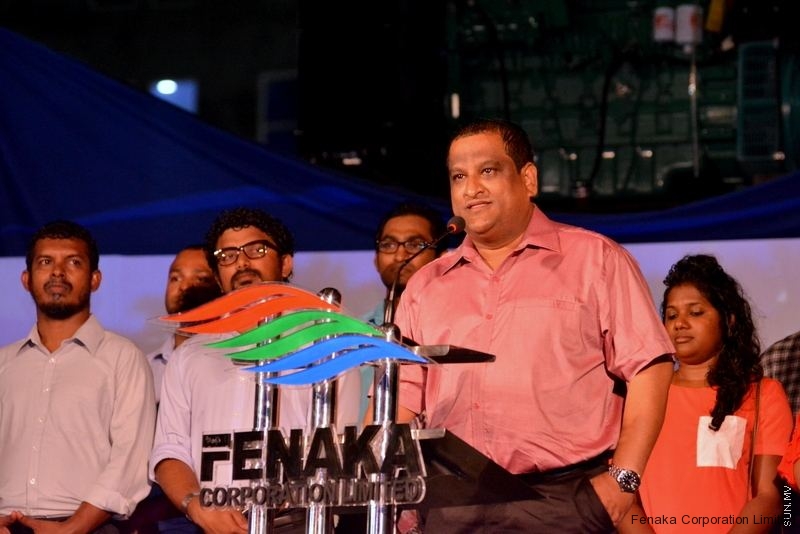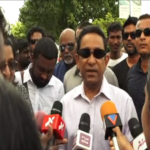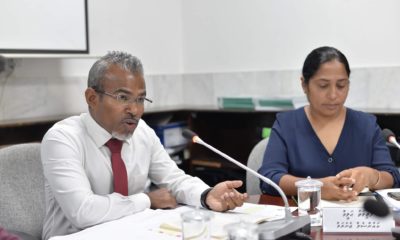A special audit of the Fenaka Corporation has uncovered a foreign exchange scam and corrupt fuel supply and procurement deals that cost the state-owned utility company millions in losses.
The damning audit report made public Wednesday flagged several suspicious transactions in 2014 and 2015 that unduly benefited private parties, including the conversion of local currency to US dollars from businesses without money exchanging licenses, the purchase of diesel at inflated prices, and the awarding of projects without a fair bidding process.
The company’s former managing director, Mohamed Nimal, resigned last year after local media reported that Fenaka was owed US$1.1 million from a speedboat company that was paid MVR17.8 million to buy dollars. Nimal, a council member of the ruling party, was later put in charge of the state-owned Maldives Roads Development Corporation after a brief stint as deputy minister of tourism.
The US$1 million scandal emerged in late 2016 after three dollar cheques made out to Fenaka with an invalid Mauritius Commercial Bank guarantee stamp bounced. In late August, the civil court ordered the speedboat company to repay Fenaka within four months.
According to the special audit, Fenaka – which provides electricity to more than 150 islands – converted local currency at the official bank rate of MVR15.42 per dollar but an unnamed exchanger was paid MVR5 million (US$325,000) as commissions in 2014 and 2015.
Some MVR95.56 million (US$6 million) was released during the two years to individuals and businesses that were not licensed for currency exchange, an offence under a 1987 central bank monetary regulation.
Fenaka also incurred a loss of nearly MVR22 million (US$1.4 million) due to the purchase of diesel from a private company at a much higher rate than that offered by Fuel Supply Maldives, a subsidiary of the state-owned wholesaler.
In one case, auditors found that Fenaka sought multiple quotations from businesses owned by the same person and bought diesel worth MVR4.3 million (US$280,000).
“There are several reasons that we suspect these companies are owned by one individual: one individual received cheque payments for transactions with all the companies; one individual’s signature is on all bills and delivery notes as the person who supplied the goods,” reads the report signed by Auditor General Hassan Ziyath.
“In some instances, one of these companies have supplied fuel for a purchase order issued to another company and a huge chunk of the money from the payments issued by Fenaka for all these companies were transferred to an account of one individual.”
The report also noted that Fenaka bought MVR26.1 million (US$1.69 million) worth of diesel from one company without seeking other quotations for the supply of diesel to all island powerhouses in Thaa atoll.
But the company only supplied fuel to one island, forcing Fenaka to use its vessels to supply other powerhouses.
The report stressed that Fenaka’s procurement rules were flawed, highlighting several cases where it was manipulated to unfairly choose suppliers and contractors.
Auditors found that two foreign companies were enlisted for sewerage projects after Fenaka invited proposals from five specific companies without a public announcement.
Fenaka continued to invite bid proposals from the five companies despite some repeatedly failing the technical evaluation, which was aimed at “showing that competitive prices were sought to pave the way for awarding projects to particular companies,” the report said.
The two chosen foreign companies were awarded 10 projects worth a total of MVR136 million (US$8.8 million).
The audit office recommended inquiries from the Anti-Corruption Commission in each case where graft or corrupt dealings were suspected.
Other cases flagged in the report,
- The emergency purchase of 38 generators based on a quotation from one company in 2014.
- Completing payments to contractors who failed to supply goods and services according to the terms of the agreement and the failure to deduct MVR2 million as a fine.
- Hiring a company that came third in the bidding process to equip the Fenaka showroom in the Hithadhoo ward of Addu City.
- Agreeing to a quoted price that was MVR2.3 million higher than the cheapest option by citing an extended credit period but completing the payment without taking advantage of the credit period.
- Awarding an MVR9 million project to a company that was allowed to revise its bid to offer a longer credit period.
- Hiring a company to transport generators despite a better proposal that was cheaper by MVR1.39 million.
- Missing documents including payment vouchers for 24 transactions, invoices for 15 transactions, and purchase order forms for seven transactions.





















